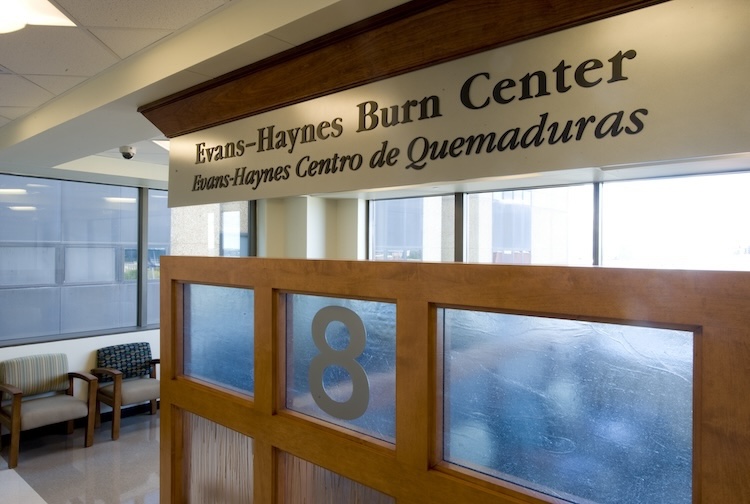
Make sure a burn injury doesn't ruin your summer fun
VCU Health Evans-Haynes Burn Center medical director provides helpful tips to stay alert while enjoying summer activities.
May 21, 2024 The VCU Health Evans-Haynes Burn Center is a regional resource for the care and treatment of burn survivors. (Getty Images)
The VCU Health Evans-Haynes Burn Center is a regional resource for the care and treatment of burn survivors. (Getty Images)
By Leigh Farmer
Grills, backyard hangouts and camping – the trifecta of fun during the summer months. However, before you send out those first invites, it’s good to prepare yourself for scenarios that could quickly snuff out the enjoyment.
Summer is the time of year that hospitals see an increase in burn injury admission. According to the American Burn Association, 37.5% of all burn admissions happen from May to August.
That's why the VCU Health Evans-Haynes Burn Center has a team of prevention professionals that work hard to educate people on the danger of burns.
“For children home from school, there are more people cooking and, as a result, more scald injuries. There are also more people having bonfires at night,” said Michael Feldman, M.D., medical director of the Evans-Haynes Burn Center.
Feldman spoke with VCU Health News about ways to keep your family and friends safe from burn injuries this summer.
What type of burn injuries happen in the summer?
It depends on your age. In adults, the Evans-Haynes Burn Center sees an increase of burns from grills and firepits. Using substances increases that risk because it slows down your ability to get away from a fire when it happens, and you are also more prone to forget something on the stove and put it at risk of catching fire.There are also less obvious dangers like the use of accelerants. Injuries from an artificial flame starter or gasoline are the worst because it is easy for people to underestimate how much an accelerant can harm you. Gasoline, in particular, can cause fumes to explode. Also, once the fire is out, don’t assume it’s no longer a hazard. The ash of an extinguished fire pit can stay hot for hours. We will get adults and kids with bad burns from walking across hot coals.
For children, the risk is different. They are more susceptible to burns from hot water and stoves. These scald burns can happen when you least expect them to. Kiddos are really creative at getting what they want and pulling it down. Try turning the handles of pots and pans in when they are on the stove and removing objects that they can climb on from the cooking area. Most importantly, stay vigilant while cooking.
What parts of the body are most vulnerable to burns in the summer?
It’s the season for shorts and t-shirts. As a result, arms and legs are where a burn injury is more likely. While tending to an outdoor fire or grill, cover your arms and legs. Consider protective gear like goggles and gloves.When you extinguish your fire at the end of the night, make sure to do it properly. Never pour water on a grease fire. It’s a common mistake that can accelerate a fire instead of putting it out. A lot of the burns I see are people who see a fire, grab the pan, and then go running. Then the grease splashes on their hand or the flames get onto their clothing, hands, and face. What you want to do instead is cover the grease fire with a metal lid or pour baking soda on it. Turn off the heat source as well.
How do you treat a minor burn?
For small burns, you want to stop the burning process by placing the burn under lukewarm water to maintain the blood flow. Remove items that might get stuck on the body if it swells, like rings. Then treat the burn with an ointment like bacitracin and cover it with a non-stick gauze.Putting a burn injury in freezing cold water is not the right move. That can cause secondary problems down the road. Throwing ice on the burn can also cause damage to the skin tissue and increases your risk of infection.
When should you call 911 and go to the hospital for a burn?
If the burn goes all the way around a body part, like your arm or leg, you’ll want to be seen by a medical professional quickly. These burns can cut off blood flow to parts of the body beyond that burn and can cause serious, permanent damage if not treated. If you have a pre-existing condition, like diabetes or other immunosuppressive disorders, you should consider coming in for treatment, no matter how small the injury.
For major burns, the earlier you get help, the better. If you witness a major burn incident, call 911 immediately. If there is time, remove the individual’s clothing so that it doesn’t stick to their wounds. Do not use cold water to try and soothe someone with a major burn. Once on the scene, first responders will cover the burn victim with blankets to maintain their core body temperature. Once at the hospital, treatment will begin. At the Evans-Haynes Burn Center, we can focus on making sure the victim’s pain is properly controlled and begin to treat the wounds.
Richmond is exceptionally fortunate to have Evans-Haynes Burn Center, the only nationally verified, Level I comprehensive burn center in Virginia for both children and adults. It’s not only the best burn center, but also the longest-running civilian burn center in the commonwealth. Part of what makes the center so revered is the community education it provides to first responders. The experienced team members at Evans-Haynes know that the sooner you seek care for a major burn, the better the outcome.



